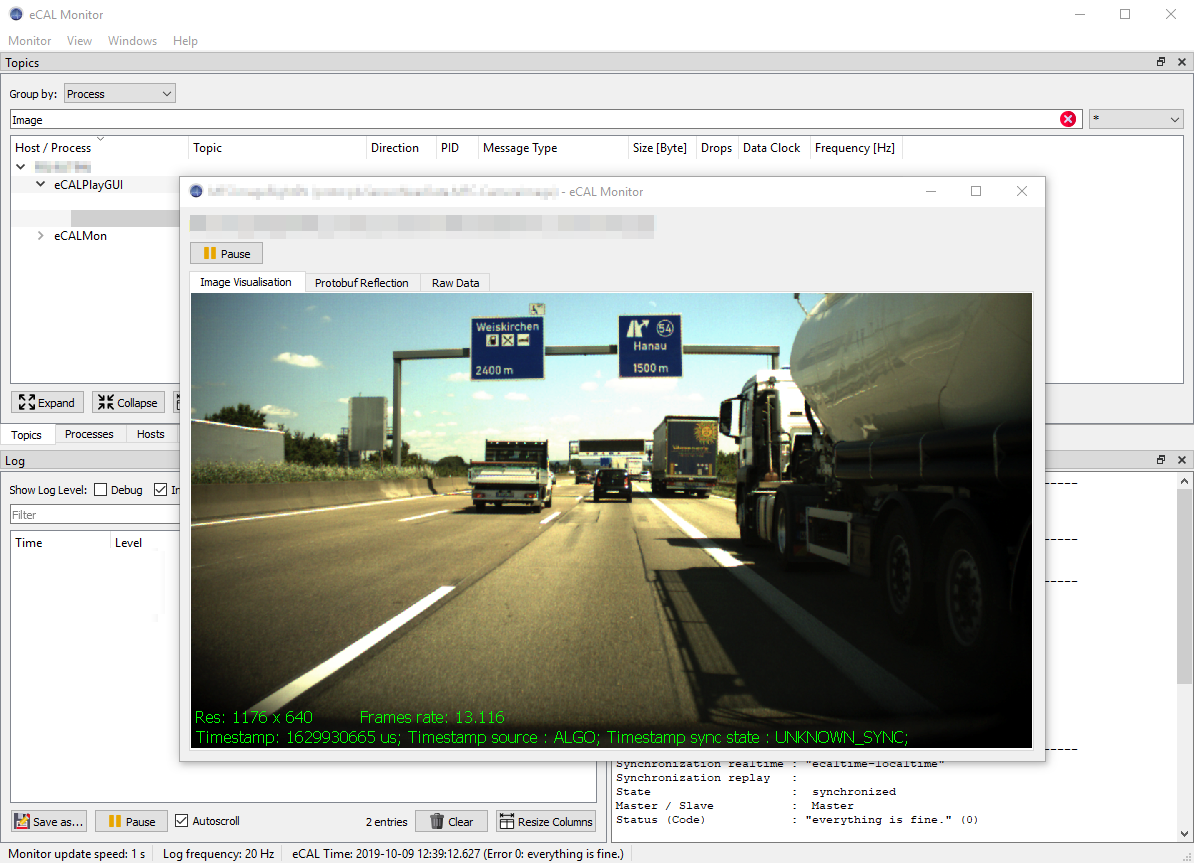The enhanced Communication Abstraction Layer (eCAL) is a middleware that enables scalable, high performance interprocess communication on a single computer node or between different nodes in a computer network. eCAL uses a publish - subscribe pattern to automatically connect different nodes in the network.
eCAL automatically chooses the best available data transport mechanism for each link:
- Shared memory for local communication (incredible fast!)
- UDP for network communication
Visit the eCAL Documentation at 🌐 http://ecal.io for more information!
-
eCAL is fast (1 - 10 GB/s, depends on payload size. Check the measured performance here)
-
eCAL provides both publish-subscribe and server-client patterns
-
eCAL is brokerless
-
eCAL provides a C++ and C interface for easy integration into other languages (like python, csharp or rust)
-
eCAL has powerful tools for recording, replay and monitoring all your data flows - decentralized
-
eCAL is simple and zero-conf. No complex configuration for communication details and QOS settings are needed.
-
eCAL is message protocol agnostic. You choose the message protocol that fits to your needs like Google Protobuf, CapnProto, Flatbuffers...
-
eCAL uses the standardized recording format HDF5
-
eCAL integrates gently into your ROS2 environment with the brand new eCAL RMW
-
eCAL supports Intel and arm platforms
-
eCAL runs on a wide variety of operating systems:
- Windows (stable)
- Linux (stable)
- QNX (stable)
- MacOS (experimental)
- FreeBSD (experimental)
Using eCAL in your project to exchange data is simple. After you have downloaded eCAL and installed CMake, you are good to go.
Check out the Hello World example from the eCAL documentation for further details.
#include <ecal/ecal.h>
#include <ecal/msg/string/publisher.h>
#include <thread>
int main(int argc, char** argv)
{
// Initialize eCAL. The name of our process will be "Hello World Publisher"
eCAL::Initialize(argc, argv, "Hello World Publisher");
// Create a String Publisher that publishes on the topic "hello_world_topic"
eCAL::string::CPublisher<std::string> publisher("hello_world_topic");
// Infinite loop
while (eCAL::Ok())
{
// Publish a "Hello World" message
publisher.Send("Hello World");
std::this_thread::sleep_for(std::chrono::milliseconds(500));
}
// finalize eCAL API
eCAL::Finalize();
}eCAL comes with a set of read-to-use tools that will help you with developing, testing and debugging your software. Command line interface versions and easy to use GUI applications are available.
-
The eCAL Monitor to visualize the data flow and inspect messages sent between publishers and subsribers
-
The eCAL Recorder to record the data sent between your eCAL nodes
-
The eCAL Player to replay the eCAL recordings later on
-
eCAL Sys to define your system configuration and monitor your applications
GitHub project using / used by eCAL:
eCAL is licensed under Apache License 2.0. You are free to
- Use eCAL commercially
- Modify eCAL
- Distribute eCAL
eCAL is provided on an “as is” basis without warranties or conditions of any kind.


